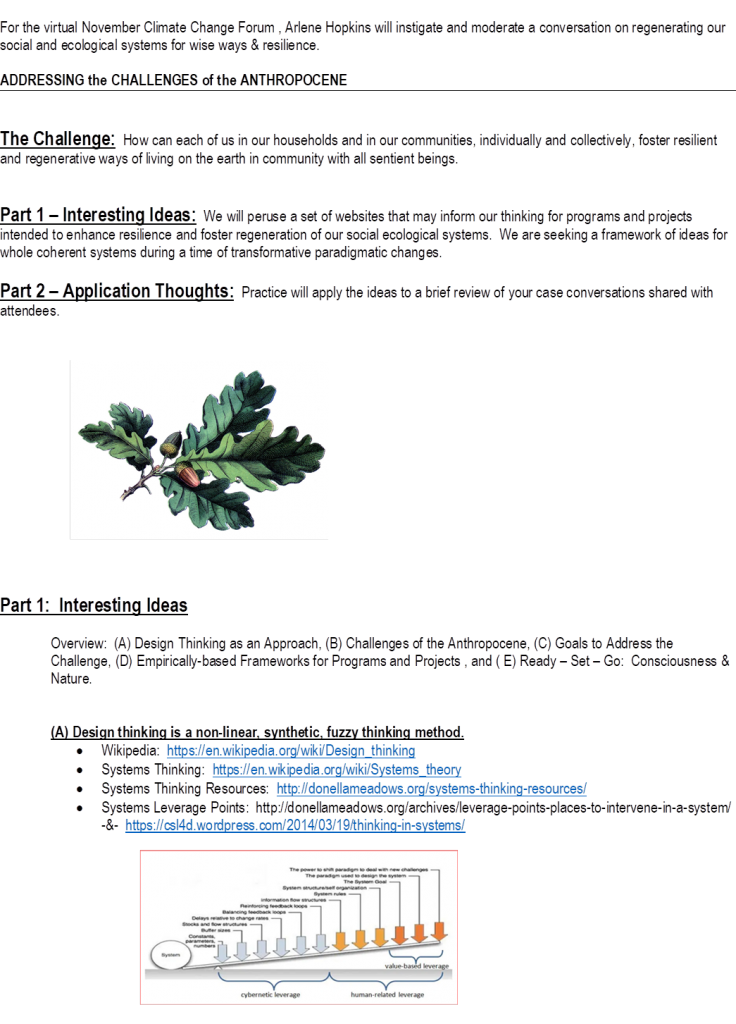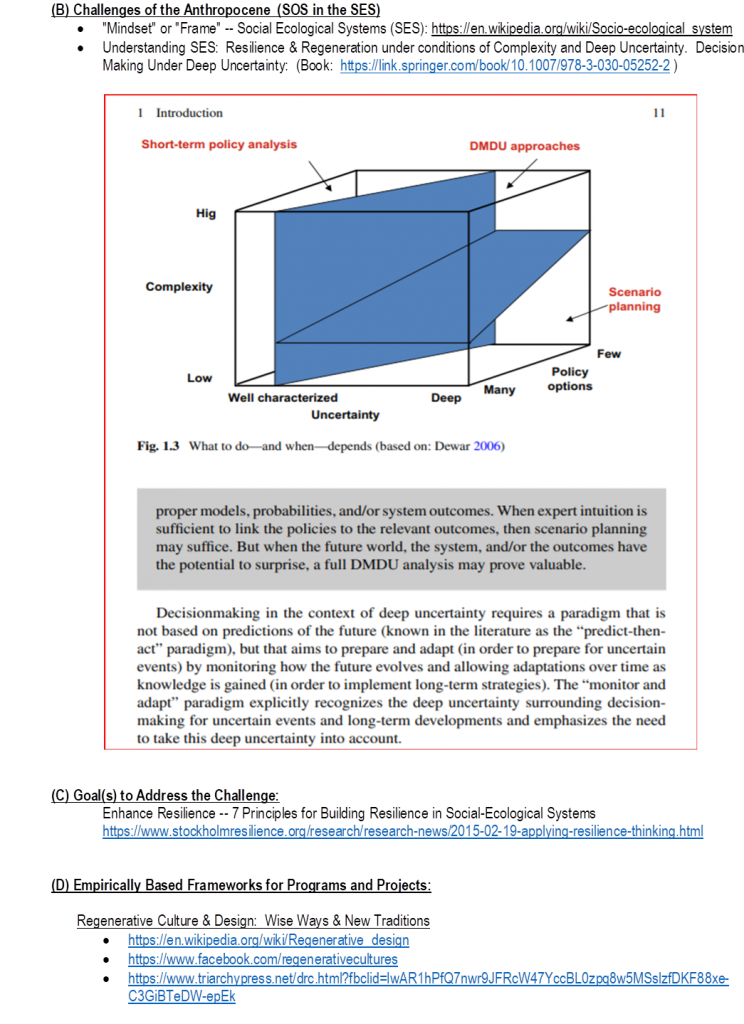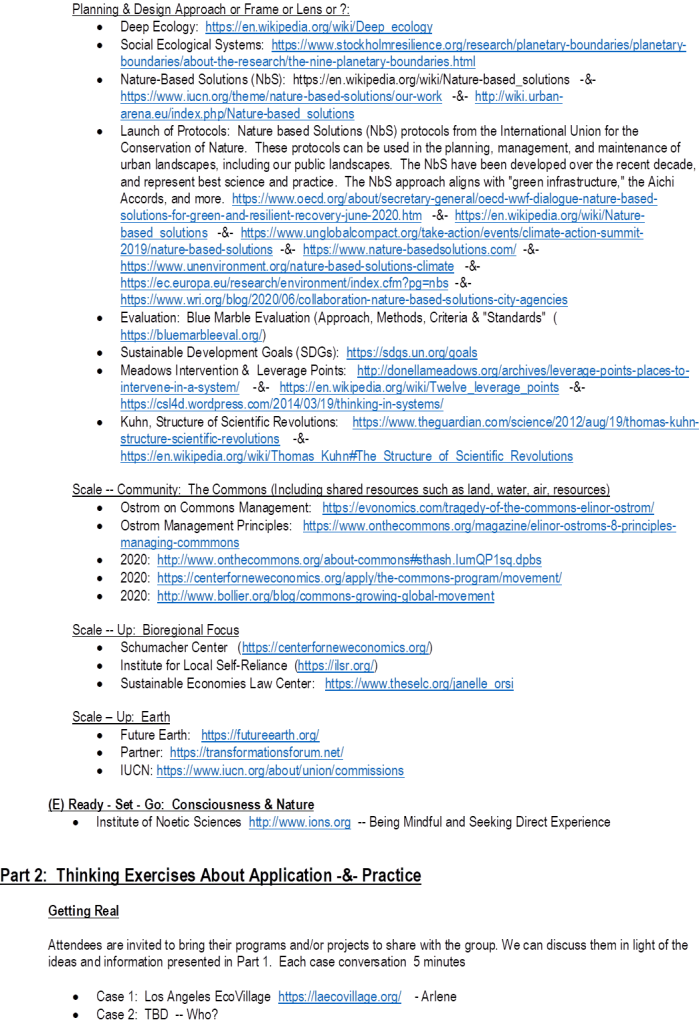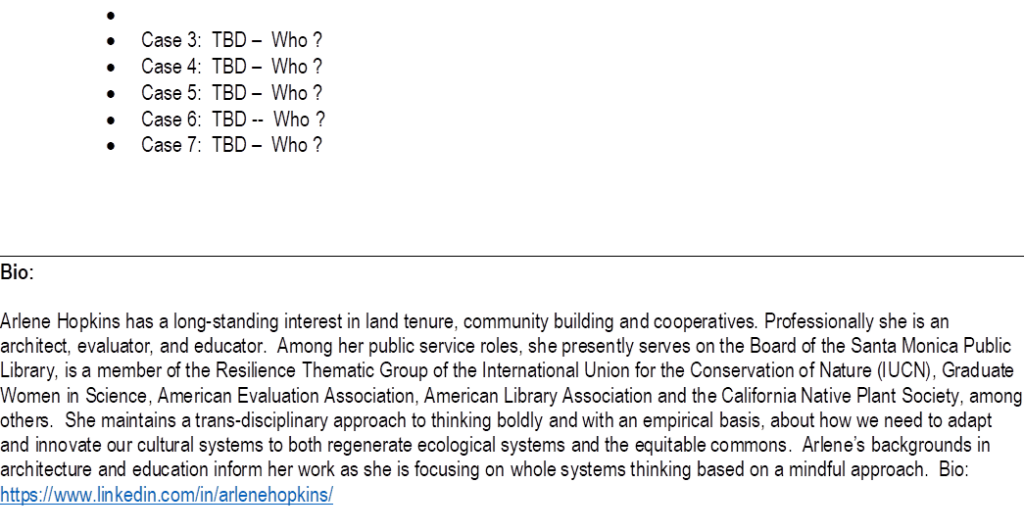Assessing the Challenges of the Anthropocene




September 2020
“Hannah Evans, Communications Director of Population Connection, will talk on the following topic for OMNI’s Climate Change Forum on Sunday, September 6 at 1:30pm. This will be presented virtually, a Go to Meeting link will follow.
The effects of climate change — including sea-level rise, droughts, floods, extreme weather, and decreasing agricultural production, are already being felt throughout the world and will continue to worsen without immediate action. Rapid population growth exacerbates the impacts of climate change by increasing vulnerability and exposing growing numbers of people to climate risk — especially in low-resource regions. This presentation explores the implications of population dynamics on global sustainable development efforts, and argues that high unmet needs for family planning in low-income countries work to compound the impacts of climate change – the effects of which will be most severe for the populations least culpable for the global environmental crisis. Slowing population growth through rights-based approaches, such as increasing access to voluntary family planning, will help address climate change and improve human rights, and should be included in broader strategies for low-carbon and climate-resilient development.”
Before our virtual presentation in October, the following narrative from Shelley offers food for thought for all to help develop your own perspectives on the topics at hand so that you can actively voice your ideas:
“The Underground Narrative in Our Culture and in Ourselves”
The normalized mindset of our culture has too often been the objectification of people, land, water and air as “economic resources”. This cultural mindset in the past has justified slavery, harsh working conditions for children, the poisoning of our planet and extinction of species a thousand times the usual rate.
The civil war freed slaves, but was followed by Black codes and Jim Crow laws. Courageous civil rights workers made demands and sacrifices that brought about civil rights reforms like the Voting Rights Act and school integration. The Nixon Administration countered these lofty victories with the Southern Strategy, a plan to increase political support among white voters in the south by appealing to racism against African Americans. In order to sustain their ability to profit from dwindling “resources”, This political power is used to subsidize fossil fuel and enact policies that benefit the corporate interests that fund resistance to environmental conservation and legislation to slow climate change. Section 4 of the Voting Rights Act was overturned by the Supreme Court in 2013, and school integration is being threatened by the corporate support of charter schools.
The cultural mindset of exploitation for the benefit of “me and mine” has again and again gained a foothold in our consciousness. Now, 400 years later, we continue to objectify and exploit and likewise to reap the harvest in the life-erasing consequences of our social and economic inequities and the burning crisis of climate change that is firing up to destroy all life on earth.
As a result of the powerful work by activist groups like Black Lives Matter, numerous organizations, coalitions and legislators are addressing the systemic disparities that are the result of policy choices deliberately designed to deliver the inequitable outcomes in which we live today. Dismantling the big-money opposition to their efforts is a massive undertaking. Surely we are all called upon to support, in every way possible, these heroic activists.
Many of our forebearers seemed to understand as we do now that our own salvation depends on justice for all. The Smithsonian Magazine cites a Quaker meeting in 1738 in which Benjamin Lay proclaimed “Quakers who fail to heed the prophet’s call (to respect all peoples equally) must expect physical, moral and spiritual Death”. He accompanied this statement by stabbing an animal bladder full of bright red poke berry juice, spilling the “blood” on the Quakers who owned slaves. Emma Lazarus (1849-1887), famous for the inscription on the Statue of Liberty, wrote “until we are all free, we are none of us free”.
While it is necessary to acknowledge and respond to the devastating outcomes of exploitation, which we identify as an overriding concern with “me and mine” at the expense of another, we must also identify and understand the source of exploitation. Within our exploitative culture and economy, we continue this rampant theft with impunity. Why do I take from another?
In order to answer, it is crucial to witness the pervasive unfolding of the “me and mine” mindset close up, on a personal level. On the surface, in daily living, I may get a passing grade. The absence of Martin Buber’s “I and Thou” goes unnoticed in our day to day activities. “Me and mine” quietly becomes “I and It” (again, Buber’s). I am challenged to see below the surface of myself, with its manifest forms, to the ingrained structures of thought that generate the invisible underground narrative that justifies “me and mine”. Generations of these same manifold layers of thought structures precede me. Unless seen, I will remain, as did they, passive in front of staggering consequences. I will also lose the possibility of living in awe of the diversity of Creation.
Diversity is not only essential to the health and resistance of every species, but equally essential to the human community and a source for the profound joy of living in a moment of reality. We stand committed to fostering and expanding a more just, equitable and inclusive region for all by purposefully addressing systemic racism in our community. We want to greet each living being and fellow human with a genuine appreciation for their lives.
For the July CCBF presentation, Geoff Olesner will present the first Virtual Climate Change Forum.
Geoff has worked with the Findhorn Community in Scotland, the Nuclear Information and Resource Center, OMNI, Arkansas Public Policy Panel, Citizen’s Climate Lobby, Wild Foundation, The Institute for Noetic Sciences, and members of the British Commonwealth’s initiative to reverse climate change. He also generates collaborations between climate scientists and individuals with profound intuitive gifts, as part of an unorthodox effort to address the climate crisis with greater insight and innovation.
Geoff will focus on five books by authors he has worked with, each of which presents clear-eyed hopeful approaches to strengthening environmental harmony in the face of catastrophic climate change: Paul Hawken’s Drawdown, Albert Bates’ Burn (on biochar) and Transforming Plastics, Thomas J. Gorerau, editor, Innovative Systems of Marine Ecosystem Restoration, and Daniel C. Wahl’s Designing Regenerative Cultures.”
First Virtual Climate Change Forum June 7, here are the links to Alberto Torres’ presentation on Covid 19 data from around the world and Shelley Buoniauto’s on racial disparity and the coronavirus:
Alberto Torres Covid-19 pandemic (pdf) reviewed general aspects of the virus that causes Covid-19, what policies countries have implemented to control the spread of the disease and how those different strategies have worked. Setting the discussion for Shelley to address the social inequality aspects of this pandemic. Shelley Buonaiuto COVID – 19 (pdf) presented on the disproportionate impact of Covid 19 on low income and People of Color.
The presentation on March 1, at 1:30 in the Ann Henry Board Room at FPL will include speakers Shelley Buoniauto, Talyor Bridges and Jack Stewart presenting on the Environmental Summit:
Jack, long-time leader in National Audubon, will discuss the following: The 4th Annual Arkansas Environmental Policy Summit of 2019, “Survival By Degrees”, took its title from the National Audubon Society report which had been released barely over a month before the Summit was held in November, 2019. Just like us, birds need food, water, and a safe place to raise their young. Using over 140 million data points and 70 environmental factors, Audubon scientists used advanced computer models to predict how birds’ ranges will change in the future based on various climate parameters. The results are alarming.
The presentation for the Climate Change Forum will explain how the study was constructed, show some of the means by which the data was used to provide visualizations for the public, and illustrate a few concrete examples of how climate change is predicted to impact some iconic Arkansas bird species. Finally, it will be explained how Audubon uses birds as an effective way to discuss controversial environmental topics and cross partisan divides
Separately, and depending on the current status of the issue, an update on the Buffalo River will be provided.
Shelley, long-time leader with CCL: The 4th Arkansas Environmental Summit addressed clean air and water, climate change solutions, renewable energy and environmental justice. Shelley Buonaiuto will speak about the presentation by Keaton Smith on the Energy Innovation and Carbon Dividend act, the bill in Congress promoted by the Citizens’ Climate Lobby, and also that of Malik Saafir and Onie Norman on Environmental Justice.
The EICDA Is modeled to drive large scale change, reducing carbon emissions 40% over the next 12 years. It now has 68 cosponsors, including 1 Republican. The Act would create jobs, inject money into the economy, save lives from reduced pollution and incentivize the development of carbon free technologies. The Dividend impact study models that 60 % of the population break even or come out ahead, making more from the dividend than paying in rising fossil fuel costs. .
Malik Saafir described Environmental Justice as how to connect the dots between conservation and social justice, saying it must take into account the entire environment of front line communities, where people live, work, play and pray. Onie Norman talked about her experience attempting to get a small town in the Delta with sewage running through the streets to install a sewage system.
As part of the Panel from the Environmental Summit Taylor Bridge, Student Advisor, Omni Center Student Life Projects will discuss the following: At the Fourth Annual Environmental Summit, Jessie Green (The White River Water Keeper) spoke about the issues of Rule 37, which passed through The Northwest Arkansas Nutrient Trading Research and Advisory Group (NANTRAG) in May. The purpose of the rule is to “implement a nutrient water quality trading program in Arkansas.” In short, nutrient trading allows a point source polluter, who may need to input more nutrients into a waterbody, to “trade credits” with another point source polluter at a different part of the waterbody, who pollutes less than the allowed metric.
NANTRAG markets this new Rule 37 as a “market-based solution to reduce water pollution.” However, lack of specifics in the language (among other reasons) have the citizens, environmental activist, The Beaver Water District, and The City of Fayetteville concerned. The members on NANTRAG ignored almost all amendments that were requested by The Beaver Water District’s attorney, Teresa Turk, Jessie Green, and concerned citizens. The City of Fayetteville passed a resolution to “not approve Rule 37 without amendments by the City of Fayetteville and Beaver Water District to better protect the water quality of Beaver Lake and Illinois River.” At the most recent meeting, a new vote was proposed, and The City of Fayetteville’s representative voted no. Because of the need for a unanimous vote, Rule 37 did not pass.
Taylor will give a more in-depth update about Rule 37, the concerns, and what is anticipated to occur after the NANTRAG meeting.
Taylor tabled at The Fourth Annual Environmental Summit for Arkansas for Container Deposit Law (AR for CDL.) AR for CDL is a grassroots effort to pass CDL (aka Bottle Bill) legislation in The Natural State. A CDL requires a deposit on glass, plastic, and aluminum beverage containers. The consumer pays the deposit at purchase and is refunded once that material is taken to be recycled. A CDL in Arkansas would increase recycling rates and as a result, decreased use of our landfills. It would also significantly impact the litter we find along our road and waterways.
Kent Bonar will present at Climate Change Book Forum on February 2, at FPL at 1:30pm in the Ann Henry Board Room.
Kent, lifetime resident and student of the Ozark Bioregion and naturalist for Newton County Wildlife Association, has as an end-goal for his presentation to give the scientific background of the natural forests of the Ozarks, its native history, and human interventions. His opening statement: “extinction has a direct link to economic exploitation, biodiversity has no value in the current system unless it’s marketable.” He’s worked tirelessly to demonstrate to Ozark National Forest personnel the need to develop healthy ecosystems over economics. He will speak about natural secession of plant species and give examples of negative USFS activities such as use of poison, scarifying, fragmentation, deforestation, pulp/chip mismanagement, roads into the forest.
The books he suggests to be knowledgeable about ecosystem services to the planet: The Hidden Life of Trees by Peter Wohlleben, and Faith in a Seed by Henry David Thoreau, compilation of later writings which includes “The Secession of Forest Trees.”
Climate Change Book Forum, 2020
For CCBF’s January presentation, environmental lawyer Mike Karcis, working with Our Children’s Trust, will present Naomi Klein’s On Fire: The (Burning) Case for a Green New Deal, 1/5/20, 1:30pm at FPL in the Ann Henry Board Room.
From publisher Simon and Schuster: #1 international and New York Times bestselling author Naomi Klein, author of The Shock Doctrine and This Changes Everything, makes the case for a Green New Deal—explaining how bold climate action can be a blueprint for a just and thriving society.
For more than twenty years, Naomi Klein has been the foremost chronicler of the economic war waged on both people and planet—and an unapologetic champion of a sweeping environmental agenda with justice at its center. In lucid, elegant dispatches from the frontlines of contemporary natural disaster, she pens surging, indispensable essays for a wide public: prescient advisories and dire warnings of what future awaits us if we refuse to act, as well as hopeful glimpses of a far better future. On Fire: The (Burning) Case for a Green New Deal gathers for the first time more than a decade of her impassioned writing, and pairs it with new material on the staggeringly high stakes of our immediate political and economic choices.
These long-form essays show Klein at her most prophetic and philosophical, investigating the climate crisis not only as a profound political challenge but as a spiritual and imaginative one, as well. Delving into topics ranging from the clash between ecological time and our culture of “perpetual now,” to the soaring history of humans changing and evolving rapidly in the face of grave threats, to rising white supremacy and fortressed borders as a form of “climate barbarism,” this is a rousing call to action for a planet on the brink.
With reports spanning from the ghostly Great Barrier Reef, to the annual smoke-choked skies of the Pacific Northwest, to post-hurricane Puerto Rico, to a Vatican attempting an unprecedented “ecological conversion,” Klein makes the case that we will rise to the existential challenge of climate change only if we are willing to transform the systems that produced this crisis.
An expansive, far-ranging exploration that sees the battle for a greener world as indistinguishable from the fight for our lives, On Fire captures the burning urgency of the climate crisis, as well as the fiery energy of a rising political movement demanding a catalytic Green New Deal.
